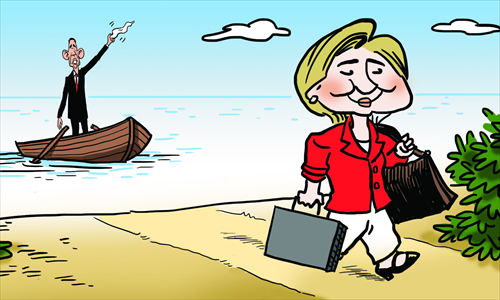Hillary likely to be Democratic favorite in 2016 campaign

Editor's Note:
US Secretary of State Hillary Clinton has received praise in the US for her handling of diplomatic affairs during her four-year term, but has drawn controversy in China for a supposedly aggressive stance. Obama has reportedly said he would love for Clinton to stay, but Clinton decided to move on. Clinton may seek the Democratic nomination again in 2016, but what will her chances be? What diplomatic legacy has she left behind?
Whether or not Barack Obama wins a second term, the potential candidacy of Secretary of State Hillary Clinton will loom over the 2016 US presidential election. Although Clinton has denied further electoral ambitions, she remains a viable candidate for the presidency.
There is little question that Clinton has made an impact during her tenure at the State Department. Clinton has taken an interest in naval affairs, and appears one of the primary voices in favor of the "Asia pivot" that promises to redistribute US political, diplomatic, and military effort toward East Asia.
These stances have arguably exacerbated tensions between the US and China, leading to some concern about what a Clinton Presidency could mean for US-Chinese relations. But Clinton's performance has generally, though not universally, won high marks in the US.
Clinton will be a clear favorite if she decides to enter the 2016 Democratic primary. Her favorability numbers remain strong, although these numbers can wilt in the heat of a campaign. While there are some other viable candidates, the Democratic bench doesn't appear particularly strong at this point.
Typically, the vice president of a two-term president becomes the presumptive heir. Joe Biden has displayed some interest in a 2016 run, but he will be 74 on Election Day 2016, as opposed to 69 for Secretary Clinton. In any case, Biden lacks the national strength to contend with Clinton.
Of course, appearances can be deceptive. In 2004, few believed that Obama could displace Clinton for the Democratic nomination. Nevertheless, Clinton's work in the Department of State probably improves her prospects by putting the Obama faction of the Democratic Party in her corner.
Even with the nomination in hand, Clinton would have to win the 2016 general election. Several strong Republican candidates are waiting in the wings. Representative Paul Ryan may become the front-runner based on his vice presidential campaign. Senator Marco Rubio of Florida could offer some hope for recapturing a portion of the growing Latino vote.
Much will depend on the state of the economy and of international society in 2016. If the US economy continues to recover, and if the Obama administration draws down forces in Afghanistan without any significant losses or embarrassment, then the prospects of a Democratic candidate running for what amounts to a third term will appear bright.
The ability of the GOP to recover from defeat also matters. If Republican Party activists determine that Mitt Romney was too moderate to win, they may argue for a more extreme candidate in 2016, which is unlikely in the US political context to lead to victory.
Nevertheless, there's a risk of overstating Clinton's propensity toward confrontation with China. The secretary of state doesn't dictate foreign policy; she makes it in conjunction with the president and other powerful members of the national security team.
While Clinton may historically have supported a more hawkish foreign policy than Obama in some areas, there's every reason to think she and Obama are of one mind on China.
There is likely to be far more continuity, in both personnel and policy, between Obama and a Clinton administration than with any Republican. Moreover, the economic ties between the US and China remain critical to the prosperity of each. No president or presidential candidate can risk that relationship without severely endangering her or his electoral prospects.
The author is assistant professor of national security at Patterson School of Diplomacy and International Commerce, University of Kentucky. opinion@globaltimes.com.cn